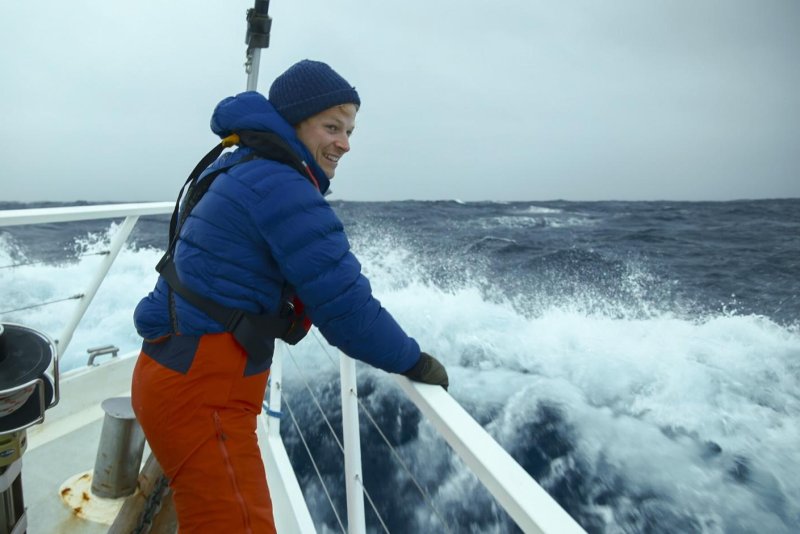'Up Close' documentarian Bertie Gregory: Animals don't read scripts
The six-part Nat Geo wildlife series premieres Wednesday on Disney+.

NEW YORK, Sept. 12 (UPI) -- Filmmaker and presenter Bertie Gregory said he had a plan at the start of his new National Geographic docuseries, Animals Up Close with Bertie Gregory, but his non-human co-stars didn't always cooperate.
Premiering Wednesday on Disney+, the six-part series shows Gregory following individual animals and capturing their daily lives for weeks at a time in Antarctica, the Galapagos Islands, Botswana, Patagonia, Indonesia and the Central African Republic.
"The lovely thing about the natural world is that animals don't read scripts," Gregory told UPI in a Zoom interview Monday.
"We document the incredible lives of these animals, alongside our struggles to keep up with them. Because that's a pretty open format, it means that we can really roll with whatever happens," he said.
Up Close builds on what the filmmaker learned making the 2022 series Epic Adventures with Bertie Gregory, which also documented animal behavior in remote locations.
"The most powerful and engaging wildlife stories were when -- rather than focusing on an entire species-- we focused on an individual animal family, and that's what's really cool about Animals Up Close. We are following not just one [type of] animal, but an individual animal," he said.
Of course, tracking specific animals that don't generally like people presented challenges.
"It means if you lose your puma or your killer whale family, you can't just find another one," he said. "That was the only puma we were interested in filming."
The team had to re-find the Patagonian big cat every day for nearly two months because they didn't follow her at night.
"Some days, the family would only move a couple of miles and hang out for most of the day, lounge around in the sun," Gregory said.
"Some days, she would leave the cubs and walk 15-plus miles up and down the mountains in a gale and we just had to keep up with her, with all our camera equipment."
MUTUAL AID
One of the highlights of Up Close shows Gregory and his team capturing footage of two humpback whales in Antarctica trying to intervene as endangered B1 killer whales hunted a seal, offering rare evidence of one marine animal trying to protect another species from a predator.
"That was certainly the most incredible demonstration of animal intelligence I've ever seen," Gregory said.
"People always want to know just how smart animals are. That, to me, was just spine-tingling to watch. To see such levels of team work and cooperation and, I think, creativity, was really amazing."
Advances in technology in recent years have made Gregory's job easier, resulting in extraordinarily beautiful footage he can share to educate and entertain TV audiences.
"Drones are probably the biggest game changer in wildlife films in the last five years," Gregory said. "They allow us to tell animal behavior stories like never before."
One of the highlights of Up Close shows Gregory and his team capturing footage of two humpback whales in Antarctica trying to intervene as endangered B1 killer whales hunted a seal, offering rare evidence of one marine animal trying to protect another species from a predator.
"That was certainly the most incredible demonstration of animal intelligence I've ever seen," Gregory said.
"People always want to know just how smart animals are. That, to me, was just spine-tingling to watch. To see such levels of team work and cooperation and, I think, creativity, was really amazing."
Advances in technology in recent years have made Gregory's job easier, resulting in extraordinarily beautiful footage he can share to educate and entertain TV audiences.
"Drones are probably the biggest game changer in wildlife films in the last five years," Gregory said. "They allow us to tell animal behavior stories like never before."

Gregory and his team also used military-grade re-breathers to help them track hard-to-find underwater subjects in the Devil Ray Islands.
"Traditional scuba-diving equipment is very noisy. You make a lot of bubbles and you are very limited by the amount of time you can spend underwater," Gregory said.
The re-breathers recycled the divers' air and produced no bubbles.
"That means you can be much quieter and get much closer to elusive animals and, critically, they allow you to stay down for much longer," Gregory said.
"We could do single dives that were more than three hours in length. Rather than being a temporary visitor to the underwater world, you become part of the environment, which is really important for wildlife stories."
Gregory wants viewers of the program to come away with an appreciation for the natural world and a better understanding of the threats it faces.
"There's enough doom and gloom in the news cycle and one thing I'm really proud of with the series is that we celebrate the conservation success stories in each episode," he said.
"There are some amazing people that really do give me hope, turning around our relationship with the natural world and I'm really excited that, as we shine a spotlight on the animals, we get to shine a light on them, as well."
No comments:
Post a Comment